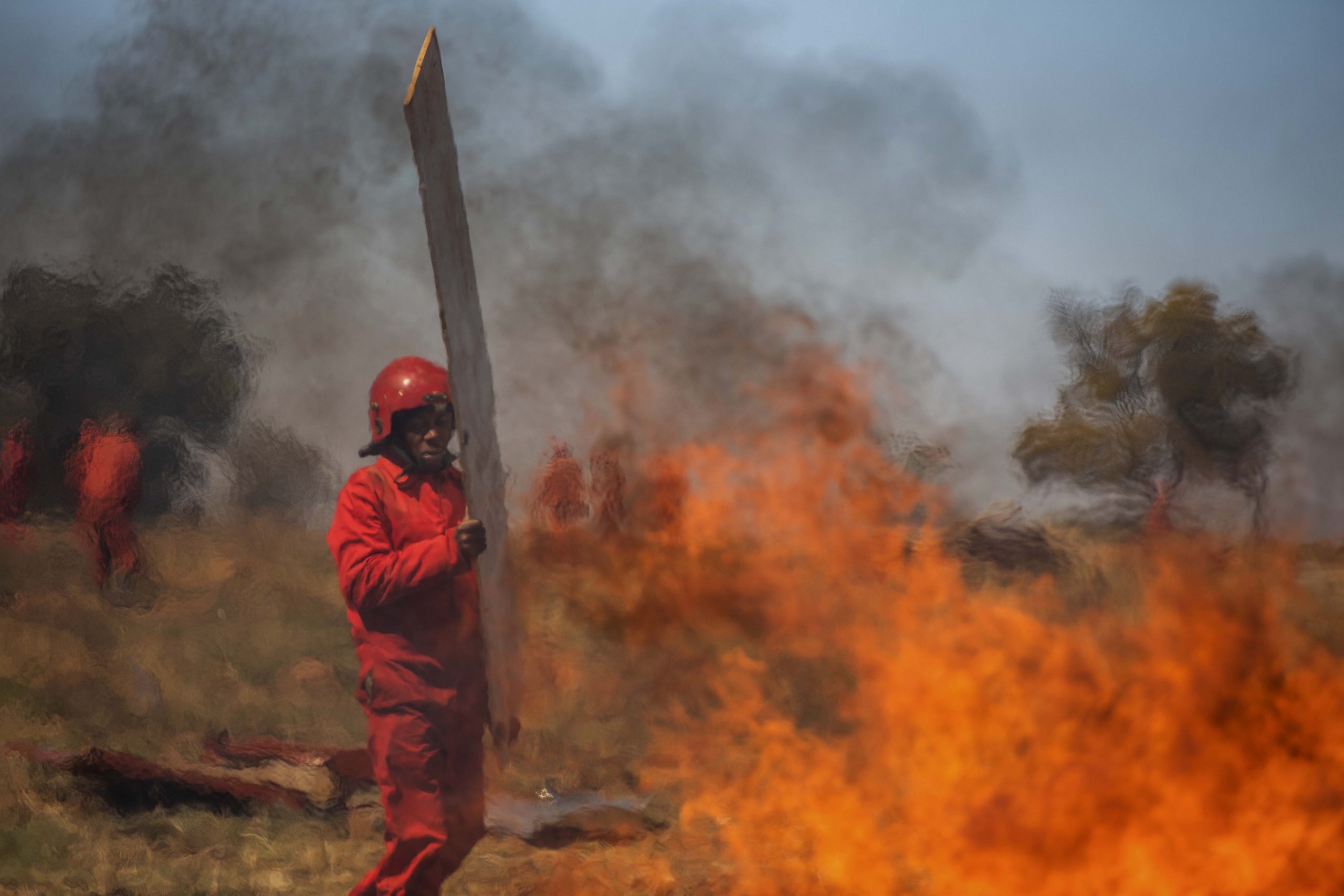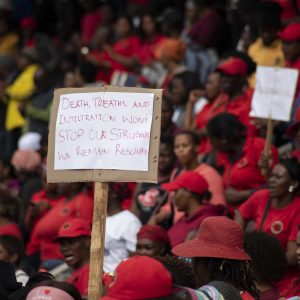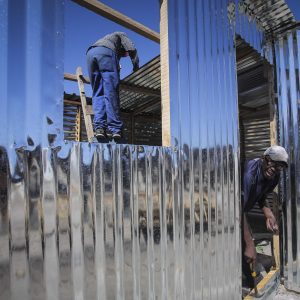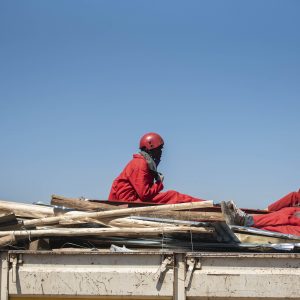Part one | The Red Ants and the City of Cape Town
Law enforcement, backed by private security, has been waging a war against Black residents with rising budgets from the City and increasingly militarised equipment.
Author:
11 March 2021

The City of Cape Town’s recent battles in its class war, under mayoral committee member for safety and security Jean-Pierre Smith, has drawn the ire of the Human Rights Commission, Parliament and the courts.
The source of the controversies has been an increasingly militarised metropolitan-level security infrastructure built by the City, which has been brutalising impoverished Black residents, in particular in concert with the City’s anti-land invasion unit in the ongoing popular disputes over land and housing.
In September 2020’s inquiry into the humiliation of Bulelani Qolani during an eviction in Khayelitsha, the issue of the lack of certification of Cape metro police and law enforcement was a source of heated discussion. In that meeting, national minister of police Bheki Cele declared Smith to be “a danger to society” because he had “opted to resource a [policing] structure that is outside the legislative and constitutional framework, and which has no oversight from the Independent Police Investigative Directorate”.
Whether in response to this criticism of its municipal policing or because the City of Cape Town deems its security agencies to be insufficient in the current battles over land, the City has now resorted to the hiring of a private eviction firm to bolster its evictions force. The private company known as the Red Ants, whose tag line describes them as specialists in evictions and removals, has been seen in Cape Town over the past months. The Red Ants, moving around Cape Town in Gauteng-registered vehicles, including Nyala military personnel carriers, have been associated in Cape Town social media and by monitors with brutality in the forced removal of people in dire conditions.
Related article:
Cape Town’s long-standing housing crisis has been intensified in the past year. Many have lost their homes and livelihoods because of the Covid-19 lockdown in March 2020 and its economic fallout, which has had a particularly devastating effect on households and communities who have had to prioritise food and water over rent.
The lockdown regulations also demanded that people stay at home, exacerbating an existing space crisis in households where, even pre-lockdown in a housing market well beyond the reach of the majority of residents, three or four generations share small quarters. Covid-19 has effectively catapulted the land and housing crisis into a slew of new land occupations across the city. From Hangberg, Mfuleni and Khayelitsha to Atlantis, Observatory and Malmesbury, people have been moving onto open land to build corrugated iron and wood homes for themselves and their families.
A number of the current land occupations border or cross into land demarcated as “nature reserves”. We are witnessing how the urban nature reserve border has become a site for brutal policing tactics, justified by a spurious political distinction between housing and “nature”.
Shot while running away
Bambanani Walaza is a 20-year-old from the Eastern Cape staying with his sister in a shack at the back end of Vrygrond, a settlement called Xakabantu close to the False Bay Nature Reserve near Muizenberg. His older sister lost her casualised employment during the lockdown and had little choice but to move out of a small rental house in Vrygrond over the sand dune to Xakabantu. On the sand dune, she put up a shack for herself, her two-year-old daughter and a friend. Walaza was staying with them over the summer, while he waited for schools in the Eastern Cape to reopen.
A few kilometres away, on the other side of the nature reserve near Lavender Hill, Daniel Benjamin, a 31-year-old who has lived in the area all his life, moved out of his mother’s house. He had been sharing the house with his parents, his sister and brother-in-law and their children, his partner and their own two children – 10 people in a two-bedroomed RDP house. There were also backyard dwellers living in their yard. Under lockdown pressure on his household, Benjamin put up a shack in an open area adjacent to his mother’s neighbourhood in what is now called the Rondevlei occupation, on land that adjoins the Rondevlei Nature Reserve.
Both Walaza and Benjamin, like many other occupiers across the city, are tending multiple rubber bullet wounds after their encounters with the City’s eviction operatives.

Walaza was shot in the back, arm and buttock on the weekend of 30 January, when the City’s law enforcement arrived to demolish Xakabantu shacks. He heard gunshots while he was inside his sister’s shack and ran outside to pick up his niece, who was playing in the yard. While he was lifting her from the ground, officers’ rubber bullets slammed into his body. Around him, other occupiers were running away from the shooting and were shot directly in the back.
One man who operates a small spaza shop from his shack got caught outside with a customer when the bullets started flying. He suffered eight bullet wounds to his arms, head and body while running away.
A festering wound in his arm a week after the attack reminded him constantly of the indiscriminate violence used against the occupiers, but he didn’t think reporting the violence would make much difference to the situation in Xakabantu – which has suffered weekly violence by law enforcement for months.
In January, while officers indiscriminately dismantled newly erected shacks on the outside edge of the Rondevlei reserve, Benjamin was shot in his genitals at a 2m distance. His legs also sustained bullet wounds. On that day, 30 people were shot. Some had rubber bullets lodged inside their bodies, a result of bullets being discharged directly at them at close range, in breach of international law on the use of non-lethal weapons.
A violent, preemptive approach
The National Disaster Management Act that governed the lockdown regulations declared evictions unlawful during the lockdown. These measures have frustrated the City of Cape Town’s agenda of zero tolerance to land occupations, as the courts have consistently, and correctly, found in favour of occupiers.
As a result, the City has drafted the Unlawful Land Occupation Framework that lays out a shift in orientation. The City will move from a reactive to a preemptive approach. Instead of sending law enforcement and the anti-land invasion unit to dismantle shack settlements, it will work to preempt the establishment of new settlements through “information gathering”, drones and extra security infrastructure on top of its already-swollen security budgets.
In 2018, the City put out a tender for R1.277 billion for private security services, even though it has already expanded its metro police service from the old traffic service to levels that have caused alarm in Parliament. The private security tender management is opaque and open to corruption, as it is made to multiple companies (including the infamous Red Ants), whose financial allocations and terms are undisclosed. Currently, monitors are seeing a rise of private security details in occupations across the City. Given the very poor oversight and management of private security in the country, these companies often get away with extreme violence and unconstitutional uses of force.
Red Ants Private Security and Eviction Services is a South African private security firm founded in 1998 in Gauteng by Johan Bosch, a former farmer from KwaZulu-Natal. The company has a reputation for violence, theft and destruction of property during evictions, and their red uniforms have come to elicit fear and dread. The company has been investigated by the Private Security Industry Regulatory Authority on several occasions. In 2001, it was investigated for contravening the regulatory authority rules for employing security personnel without the requisite training. They were later again investigated for executing evictions without a court order.

The Red Ants named one of their employees, Selepe Madimetja, a director in 2005 without his knowledge, seemingly in an act of racial fronting. After this the City of Johannesburg stopped contracting them until 2014 when they re-emerged as the contracted company for a large eviction from an occupied building in Hillbrow. The Gauteng Department of Human Settlements, a frequent employer of the Red Ants, then signed an agreement with the company in an attempt to counter the violent treatment of residents during evictions. The agreement primarily attempted to ensure that those who faced removal be given notice of the evictions, a requirement that is already present in the Prevention of Illegal Eviction from and Unlawful Occupation of Land Act but which was not being implemented by the company.
Reports of the ruthless behaviour of the Red Ants have included theft and destruction of building materials, personal belongings and even identity documents, sexual assaults and several deaths as a result of brutal physical assaults. Photographic and video footage have been collected of the Red Ants using tools that are prescribed for breaking down structures, including crowbars and bolt cutters, as weapons to beat and stab residents who resist eviction.
A Facebook page called the “Red Ants Cape Town” became active in January 2017 with a video announcement that “the Red Ants have arrived in Cape Town”. Since then municipalities have deployed the Red Ants to evictions and protests across the Western Cape, including a food garden in Khayelitsha, land occupations in Lavender Hill and in the Overstrand Municipality, and most recently in Atlantis, where rounds of spent ammunition were collected after a Red Ants night operation last month. Red Ants tactical workers are currently stationed at Rondevlei with semiautomatic weapons and large armoured vehicles.
During several recent evictions in and around Cape Town, members of the Red Ants have been seen in full black tactical gear, including armour, helmets and rifles, rather than their usual red overalls. These “stabilisation units” appear to be a new development in the company’s offering, a specialised and armed force with weapons ordinary Red Ants workers would not have been allowed to carry. Whereas ordinary Red Ants workers are transported to work in the back of large trucks, these new units have their own militarised vehicles. In the recent evictions at Rondevlei, these stabilisation units were present and openly fired at residents with rubber bullets.
A history of forced removals
The violent removal of Black people and their shacks has a very long and vicious history in Cape Town. Forced removals are as old as the colonial city, and gathered momentum under apartheid, when the full might of the military was used to destroy Black people’s right to the city. Squatting was a central form of resistance to apartheid urban planning and the Group Areas Act. An erected shack was an act of defiance of racial rule, and a claim on a city that constantly sought to expel and diminish Black households. The anti-land invasion unit and the increasingly militarised tactical units of law enforcement and private security firms such as the Red Ants continue this long history, and bring shame on the current administration.
Related article:
To appear different to their apartheid predecessors, the current City managers have to find new justifications for the ongoing forced removals, ones that don’t appear to be a replication of apartheid urban policy. These justifications often involve the promise of public infrastructure such as parks, roads, schools and public open spaces. It also involves the argument that land must be reserved for “nature”. But if there has been no sign of any such developments over the past 25 years, no political will to create urban infrastructures that improve the lives of the majority of the city’s residents living on the Cape Flats, and no serious interventions into the urgent social and environmental inequalities in the city, such justifications are quickly seen for what they are: excuses for the continuation of forced removals and the anti-Black, anti-poor agenda of the City’s management.

In part two, we look at how the City of Cape Town falsely uses the excuse of nature conservation to target and forcibly remove otherwise homeless people.



